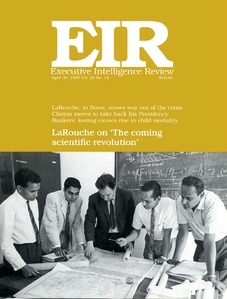Interviews
Masao Hori
Mr. Hori recently retired from the Japanese Power Reactor and Nuclear Fuel Development Corp., and now is a researcher with Nuclear Systems Association, based in Tokyo. In the early 1990s, he headed an international committee to prepare a “Vision Document” on the second 50 years of nuclear energy. He is on the board of directors of the American Nuclear Society and of the Japanese Atomic Energy Society, whose International Committee he chairs.
Departments
Africa Report
by Linda de Hoyos
An event of “extreme gravity.”
Andean Report
by Valerie Rush
Colombia’s FARC gets State Dept. boost.
Australia Dossier
by Allen Douglas
A voice for sanity.
Agriculture
by Marcia Merry Baker
Crisis meetings in U.S. farm states.
Editorial
Two doctrines on the table.
Book Reviews
Israel: the ultimate ‘rogue state’
by Jeffrey Steinberg
Gideon’s Spies—The Secret History of the Mossad, by Gordon Thomas.
Science & Technology
Breeder reactors are ready for development
by Marjorie Mazel Hecht
There is no nuclear waste problem if we complete the nuclear fuel cycle, by reprocessing spent fuel. Nuclear energy is literally a renewable energy source.
‘International lab’ needed to build fast breeder reactors
An interview with Masao Hori.
Economics
Bankers’ looting is leading cause of childhood death
by Richard Freeman
Worldwide, each year, approximately 12 million children under the age of 5, die. More than 95% of these deaths could have been prevented.
President Chávez goes for ‘IMF revolution’ in Venezuela
by David Ramonet
Chávez is threatening to disavow the authority of both the National Congress and the Supreme Court, and thereby, of the Constitution itself.
Fujimori shifts, halts privatizations in Peru
by Luis Vásquez Medina
The pragmatic President appears to have begun to realize that the panacea of privatization is just a gambit on the part of international speculative capital.
Business Briefs
Feature
The coming scientific revolution
by Lyndon H. LaRouche, Jr.
Science is the essence of politics, writes LaRouche. “In the end, the fundamental issue of society, as of science, is the issue of the nature of the human individual, is the nature of that principle of cognition by which the validatable ideas of a single individual can live and reign in the universe forever after. That is the principle to govern the kind of world we must fight to build.”
International
LaRouche outlines ‘the way out of the crisis,’ at EIR forum
by William Engdahl
Presidential candidate Lyndon H. LaRouche, Jr. delivered the keynote address at an EIR conference in Germany on April 21, on “The Way out of the Crisis: Europe, the World Financial Crisis, and the ‘New Cold War.’”
Africa’s ‘Elder,’ President Moi of Kenya, works for peace
by Linda de Hoyos
Peace is taking on an ever-greater urgency. Since the end of the Cold War, the British Commonwealth policy of producing “failed states” has resulted in Kenya’s being surrounded by a “sea of troubles.” Of Kenya’s five neighbors, with the exception of Tanzania, all are at war.
Netanyahu threatens war on Syria, Lebanon
by Dean Andromidas
International Intelligence
National
Clinton moves to take back his Presidency
by Debra Hanania Freeman
The President took the occasion of an April 15 address before the American Society of Newspaper Editors to reassert his control over U.S. foreign policy, following the violent 18-month assault on his Presidency and the usurpation of power by Al Gore’s Principals Committee. But, he has a long way yet to go.
Documentation: From the President’s recent speeches.
Schiller Institute’s call for Balkan Marshall Plan
Special Master named in LaRouche case vs. FBI
The tactics used by the FBI against the LaRouche movement in the United States went far beyond house arrest or secret police surveillance operations in a developing country—and the oligarchy is desperate to keep this story from coming out.
Sweeney urges ‘New Bretton Woods,’ halt to deindustrialization
by Marianna Wertz
When the head of the trade union movement in the most powerful nation in the world tells the Trilateral Commission that the world’s future “will largely be determined by the response to the current global economic catastrophe,” and that a new Bretton Woods is needed, world leaders will ignore it at their peril.
Congressional Closeup
by Carl Osgood
National News



